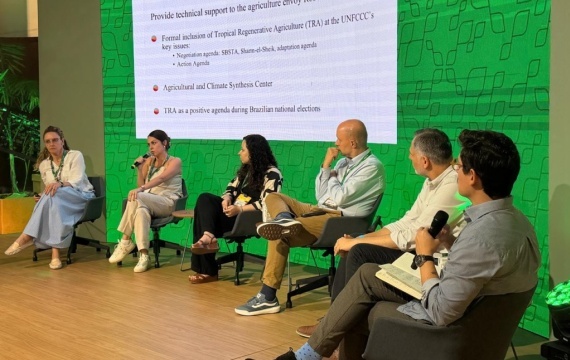Researchers Highlight the Role of Tropical Regenerative Agriculture in the Climate Agenda at COP30
On November 17, the panel “The Role of Tropical Regenerative Agriculture in the Climate Agenda” emphasized the importance of the Intelligence Network on Agriculture and Climate, an initiative that brings together technical institutions to articulate, formulate, and align strategies for the transition to Tropical Regenerative Agriculture. The event featured the participation of Talita Pinto, Coordinator of the Bioeconomy Observatory at Fundação Getulio Vargas (FGV Bioeconomia).
The researcher presented the Network’s strategy, which includes producing technical analyses such as policy briefs and evaluations; defining priority agendas; and engaging stakeholders from the agribusiness sector and civil society. “This network’s mission is to produce technical analyses and foster dialogue with key actors, guiding public policies and sustainable practices,” she explained.
The initiative includes the Center for Agribusiness Studies (FGV Agro), Agroicone, Fundação Dom Cabral (FDC), Insper, Agro Global, Instituto Equilíbrio, and IPAM Amazônia, with support from the Instituto Clima e Sociedade (iCS).
Panelists included Rodrigo C. A. Lima (Agroicone), Eduardo Bastos (Instituto Equilíbrio), Daniel Parreiras (Fundação Dom Cabral), Ludmila Rattis (IPAM), Gabriela Mota da Cruz (Insper), and Talita (FGV Agro), who presented the network’s strategic pillars and priorities for 2025.
For the coming year, the group set out to provide technical support to the Agriculture Special Envoy, Roberto Rodrigues, consolidating an agenda based on the centrality of science, technology, and innovation for climate adaptation. Additionally, the network aims to promote the diplomatic repositioning of tropical agriculture on the global stage, integrate food and energy security agendas, secure climate finance commitments for sustainable agriculture, and coordinate the coexistence of productive systems with civil society actors.
The discussion reinforced that tropical regenerative agriculture is a key component in addressing climate challenges, balancing production, conservation, and social inclusion. The joint efforts of institutions such as FGV Agro, IPAM, Insper, Instituto Equilíbrio, and Agroicone highlight Brazil’s role as a global leader in building solutions for a fair and resilient food system.
Full coverage of Fundação Getulio Vargas’ participation in COP30, including agendas, exclusive content, and contributions from the institution’s researchers to global climate action, is available on the FGV Climate Agenda Platform. The opinions expressed in this publication are the sole responsibility of the contributing researchers and do not necessarily reflect the official position of Fundação Getulio Vargas.
